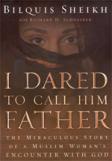
As we travel the journey of life, we all come to know of people that we never get to meet in the flesh but who leave a marked impression on us. For me, one such person is the subject of this article. Her name is Bilquis Sheikh, and she was born on the 12th of December, 1912 in what is now Pakistan. She belonged to a noble Muslim family descended from Nawab Mohammad Hyat and her ex-husband, General Khalid Masud Sheikh, was Interior Minister of the country from 1962 to 1965. After her divorce from the General, she came to live in a village called Wah, just off the Grand Trunk Road between Rawalpindi and Peshawar. She owned a comfortable house there and kept an impressive flower garden that gave her much pleasure. It was in this garden that she had an experience which initiated a profound change in the course her life.
One evening, as the sun was setting, she was taking a stroll in her garden when she felt a chill breeze. Then a mist blew past her and she felt something touch her hand. She screamed in fright and ran indoors, where her maid servants took care of her. After hearing about her experience they urged her to get a blessing from the local mullah but not being a fervently religious person, she refused. Some days later however, her little grandson Mahmud who was living with her became ill so, she relented.
After the blessing, Mahmud quickly got better and Bilquis felt drawn to read the Koran. As she read she noticed that other religions were mentioned including Christianity and she decided to have a look at the Bible too. She acquired a small copy and opening it at random, scanned the page.
The passage that immediately caught her eye deeply touched her heart. It said: I will say to a people that was not mine, 'You are my people', and to a nation I never loved, ‘I love you’. Instead of being told, ‘You are no people of mine’, they will now be called the sons of the living God (Rom.9:25-26). She felt disturbed by these words and quickly closed the Bible. However, the following afternoon, while relaxing on her bed she felt drawn to read more and continuing on from where she had left off she read: But the Law has found its fulfillment in Christ so that all who have faith will be justified ... the word is very near to you; it is in your mouth and in your heart … that if you declare with your mouth that Jesus is the Lord and if you believe with your heart that God raised him from the dead, then you will be saved (Rom.10:4, 8-10). These words disturbed her even more, as they were alien to her faith as a Muslim, but nevertheless she fell asleep. Then she had a dream.
She dreamt that Jesus had come to visit her home for two days and they ate together in joy and peace. Then the scene suddenly changed and she was on a mountain top talking with a man she knew as John the Baptist, and asking him if he would lead her to Jesus. The strange thing was that she had not yet read anything about John the Baptist and didn’t even know who he was. Some days later, she had another dream. In this one, a traveling perfume salesman came to her house and, as he departed, he left a golden jar filled with perfume on her bedside table saying, “This will spread throughout the world.” Then she awoke and looked at her bedside table, but all that was there was the Bible. Later on, a Christian friend referred her to a passage in the Bible that said: Thanks be to God who, wherever he goes, makes us, in Christ, partners of his triumph, and through us is spreading the knowledge of himself like a sweet smell, everywhere (2Cor.2:14).
Some days later, she had another dream. In this one, a traveling perfume salesman came to her house and, as he departed, he left a golden jar filled with perfume on her bedside table saying, “This will spread throughout the world.” Then she awoke and looked at her bedside table, but all that was there was the Bible. Later on, a Christian friend referred her to a passage in the Bible that said: Thanks be to God who, wherever he goes, makes us, in Christ, partners of his triumph, and through us is spreading the knowledge of himself like a sweet smell, everywhere (2Cor.2:14).
Her next experience came when her little grandson got an ear ache, and she took him to a Christian hospital in the nearby city of Rawalpindi where his mother Tooni worked as a doctor. They had to stay the night and during that time the doctor in charge of the hospital, a Catholic nun, dropped by to check that all was well. While they chatted, the nun noticed that Bilquis had a Bible with her and asked why she, a Muslim, should be reading the Holy Book of the Christians. Bilquis told her of her search for God and the nun said in reply: "Why don’t you pray to the God you are searching for? Ask Him to show you His way. Talk to Him as if He were your friend. Talk to Him as if He were your father." Bilquis had a very loving relationship with her father, and so for her this was a wonderful suggestion. Her father always took time to listen to her and she sensed that her heavenly Father would too.
At the beginning she struggled with the new concept of God she had discovered, but soon she found herself filled with confidence and love and from then on she lived and moved in the Presence of God her Father. Whenever she had a decision to take or a choice to make, she let the sense of God’s glory be her guide. If she felt God was there she could go ahead but if His glory faded she knew she was not on the right path.
As time went by, Bilquis felt an ardent desire to become a Christian. She had read in the Bible that Jesus said: Look, I am standing at the door, knocking. If one of you hears me calling and opens the door, I will come in to share his meal, side by side with him (Rev.3:20), and this text reminded her of the dream she had had of His visit to her. She saw in it a positive sign to go ahead and seek baptism. She was well aware that she would get into deep trouble with her family, friends and the whole Muslim community but guided by her sense of God’s glory, she was sure that she must follow where she felt God was leading her.
She spoke to some Christian friends about her desire to be baptized but fearing the consequences for her, they hesitated. However, when Bilquis insisted they finally agreed and the date of January 25th 1967 was set for the ceremony. On the night of January 24th, however, Bilquis felt an irresistible urge to receive the baptism of immersion as Jesus had in the Jordan. On impulse, she filled a bath, sat into it and baptized herself. She was quite aware that this was completely unorthodox but she felt God’s Presence guiding her. The next day, she mentioned nothing to her friends but when they baptized her by simply sprinkling her with water, she felt very happy about what she had done herself.
Once her extended family and her Muslim friends got to know that Bilquis had become Christian, there was a period, first of all, of silence and isolation, then anger, and gradually, later on, acceptance. In the local community, however, threats began to be made, and there was fear her life and that of her little grandson might be in danger. An attempt to burn her house confirmed that the fear was well founded. Added to this, there was also political upheaval in the country, and the rulers of that time were of an opposing party to the one to which Bilquis belonged.
Soon, it became clear that she would have to leave Wah and possibly her country. She felt deeply the sacrifice this would entail but as usual, she let herself be guided by her sense of God’s Presence. To give up her house, her garden, her wealth, her comforts, the proximity of her family, and even her country, would be beyond her own capacity, but guided by God she felt enough courage to take the step. Thus, with the help of her prayers, her dreams, and the advice of family and friends, in 1973 she set out for the United States of America with her grandson. Since becoming a Christian in 1967, she had been invited to participate in various Christian assemblies and to tell about her journey with God her Father. In these meetings she had become friends with people who encouraged her to let her story reach a wider audience, but she didn’t feel ready at that time. Now six years later, after all that had happened to her, she was prepared to do whatever would keep her in God’s Presence. As a result, she came to address many congregations and in 1973 she published her autobiography, titled I Dared to Call Him Father.
Since becoming a Christian in 1967, she had been invited to participate in various Christian assemblies and to tell about her journey with God her Father. In these meetings she had become friends with people who encouraged her to let her story reach a wider audience, but she didn’t feel ready at that time. Now six years later, after all that had happened to her, she was prepared to do whatever would keep her in God’s Presence. As a result, she came to address many congregations and in 1973 she published her autobiography, titled I Dared to Call Him Father.
Bilquis lived in the United States until 1987. Then she suffered a severe heart attack and was persuaded by her immediate family to return to Pakistan. She lived at first with her grandson Mahmud, who had also returned, and then she moved in with her daughter Tooni in Rawalpindi, in whose arms she died peacefully on April 9th 1997. She now rests in a Christian graveyard in Murree, a hill station in the beautiful foothills of the Himalayas.
Her tombstone bears the simple inscription:
Bilquis
Born 12-12-12
Died loving the Lord
9-4-97.
It is through what Bilquis wrote that I came to know and admire her so much. Her sensitivity to the Presence of God in her life, her openness to God’s word in the Bible, her courage to follow where she felt God was leading her, and her willingness to put her relationship with God her Father before all else, has been an enduring source of inspiration and strength for me. In my estimation, she truly made her own the mind of Christ Jesus (See Phil.2:5-11), and now I am sure, enjoys the fullness of life and joy with Him forever.
Columban missionary Fr Joe Joyce SSC is based in Pakistan.
Read more about Christain-Muslim relations